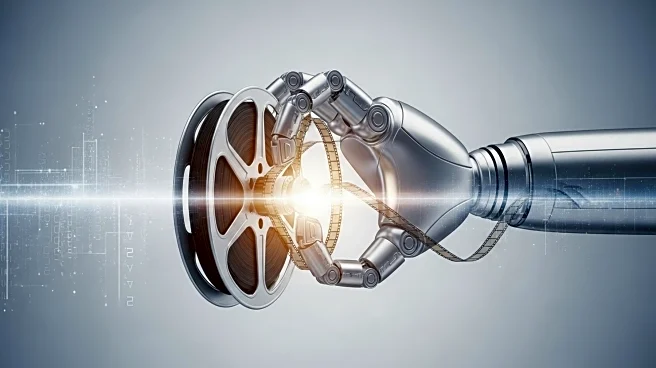What is the story about?
What's Happening?
Lionsgate, a major movie studio known for franchises like John Wick and The Hunger Games, is encountering difficulties in its attempt to produce movies using generative AI technology. Earlier this year, Michael Burns, Lionsgate's vice-chairman, announced a partnership with Runway AI, a generative AI company, to repackage one of its series as an anime generated entirely by AI. However, the plan has not materialized due to several obstacles, including the limitations of Runway's model and copyright concerns. The partnership aimed to create a custom AI model using Lionsgate's film library, but the library's size is insufficient for developing a fully functional model. Additionally, legal questions regarding the use of AI-generated content have emerged, complicating the process further.
Why It's Important?
The challenges faced by Lionsgate highlight the complexities of integrating AI into the film industry. While AI offers potential benefits such as cost savings and efficiency improvements, the limitations of current technology and legal uncertainties pose significant hurdles. The situation underscores the need for substantial data to train AI models effectively, which even large studios like Lionsgate struggle to provide. This development could impact how studios approach AI in filmmaking, potentially slowing down the adoption of AI-driven production methods. Stakeholders in the film industry, including actors, writers, and directors, may need to address new legal frameworks to accommodate AI-generated content.
What's Next?
Lionsgate continues to explore AI applications in film and television projects, aiming to enhance quality and storytelling opportunities. The studio is reportedly using AI for creating trailers and improving licensing efficiency. As the industry navigates these challenges, further collaboration between studios and AI companies may be necessary to overcome technical and legal barriers. The outcome of Lionsgate's efforts could influence other studios considering AI integration, prompting discussions on ethical and legal standards for AI-generated media.
Beyond the Headlines
The use of AI in filmmaking raises broader ethical and cultural questions about creativity and authorship. As AI technology evolves, the distinction between human and machine-generated content may blur, challenging traditional notions of artistic creation. The industry must consider the implications of AI's role in storytelling and the potential impact on employment for creative professionals. These developments could lead to a reevaluation of intellectual property rights and compensation models in the entertainment sector.















